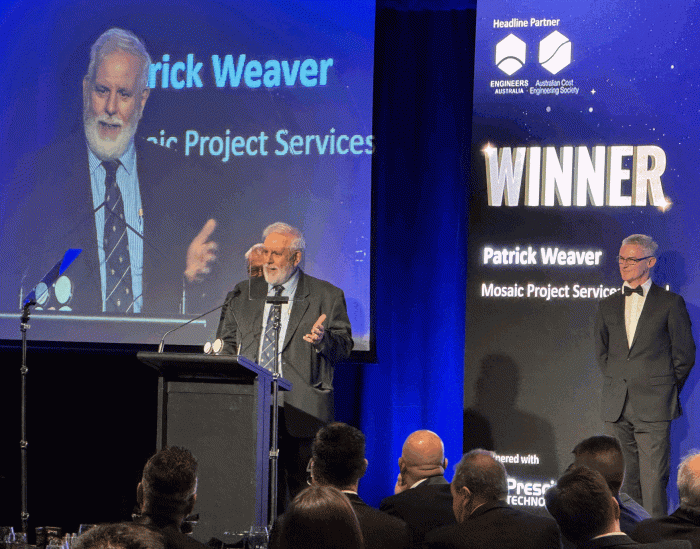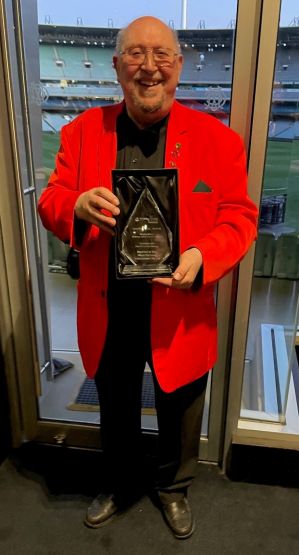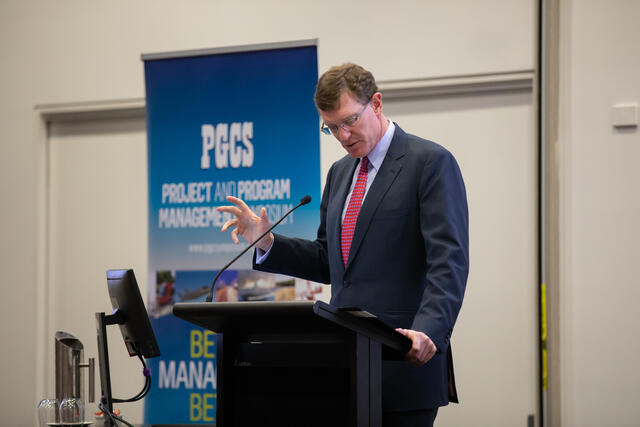
Patrick Weaver 'Lifetime Achievement Award' 2023.

PGCS Director, Patrick Weaver, PMP, PMI-SP, FCIOB, FAICD, was awarded the Wayne Wilson Award for Lifetime Contribution in Project Controls at the Project Controls Expo Australia, 2023. The award recognizes his contribution to project controls and support to hundreds of projects and trainees over 50 years.
He started as a project engineer in the UK, and worked on a number of construction projects in SE England and the Middle East before migrating to Australia in 1974. For his first 10 years in Australia, he worked as a scheduling expert for major builders in Queensland, developing and maintaining schedules for high-rise buildings, utilities, and other construction projects.
He started his own consultancy business in 1985 specializing in providing scheduling services using scheduling software, initially ICL VME PERT (mainframe), then with PCs becoming available, Micro Planner for the PC. In 1987 he became Managing Director of Micro Planning International Pty Ltd (MPI), one of the pioneers of graphical PC scheduling software for the Apple Macintosh and Windows PCs. In Australia MPI was responsible for the sales, support, and training of clients and their staff as well as providing consultancy services and input to the Micro Planner development process.
In 1999 Patrick relocated from Brisbane to Melbourne and started Mosaic Project Services Pty Ltd. While continuing to provide some consultancy services, often as an Expert in litigation or as an Arbitrator or Adjudicator Patrick’s interest shifted to training the next generation of project controls professionals and developing new ideas and concepts.
His primary area of impact in the development of the project management profession has been in the training and development of people through formal and informal courses, support, and mentoring. He has been an active member of PMI since 1986 and AIPM since 1989. Over the years he has held various board and working group positions within both organizations, as well as the Project Management College of Scheduling (PMCOS-USA) and the Guild of Project Controls.
Patrick has been a member of Standard’s Australia committee MB12 since 2006. His key contributions were to the development of the original ISO 21500:2012 Guidance on Project Management, and the development of ISO 21505:2017 Guidance on Governance where he was the team leader for one of the two main writing groups. He has also contributed to many of the other standards developed by ISO TC258 and a number of PMI Standards including the PMBOK® Guide.
He has also developed numerous papers, articles, and conference presentations, written two books, and contributed to four other books. He has also contributed to the development of the PMOZ conference, and for the last 15 years the PGCS.
Patrick has been actively involved in expanding the project controls toolset. He has supported the development of Earned Schedule and has had direct involvement in the creation of two distinct processes, the Stakeholder Circle® and Work Performance Management™. This practical legacy is curated and maintained by Patrick in the free library section of the Mosaic website. This free resource is accessed at: https://mosaicprojects.com.au/PMKI.php.
Raphael (Raf) M. Düa 'Lifetime Achievement Award' 2022.
 PGCS Director Raf Düa has been awarded the inaugural Wayne Wilson Lifetime Achievement Award at the Melbourne PC Expo 2022. This award was both a happy and a sad occasion.
PGCS Director Raf Düa has been awarded the inaugural Wayne Wilson Lifetime Achievement Award at the Melbourne PC Expo 2022. This award was both a happy and a sad occasion.
Wayne was a long-term friend and supporter of PGCS and was well known and respected in the wider project controls community. To commemorate his life and early death, Prescience Technology (also a long time supporter of PGCS) sponsored the Wayne Wilson Lifetime Achievement Award to recognize a person who has had a leading role in the advancement of project controls.
The nomination submitted on behalf of Raf noted:
Raphael Michelangelo Düa (1939 – still going)
Raphael M. Düa has been working for the past 65 years in project controls and project management.
His involvement in project controls started in 1956/7 as an operator for the British Tabulating Machine Company (BTM) first supporting the work of Kelly & Walker (the original authors of the Critical Path technique), and then the US Navy ‘Special Projects Office’ (SPO) for the Fleet Ballistic Missile program (Polaris) and Booze Allen Hamilton, developing and running the original PERT program. The BTM machines read and sorted punch cards containing the data and software needed by the early mainframe computers.
Returning to the UK, Raf spent almost 32 years with the British computer company International Computers Ltd (ICL) [Now Fujitsu in Australia and New Zealand], in various parts of the world; where he was part of the team that developed the series of Critical Path & PERT software packages ICL produced from 1958 to 1984. These were ICT 1300 Series PERT, ICT 1500 Series PERT, ICT 1900 Series PERT, ME29 PERT, 2400 PERT, VME PERT being the last one in 1983. During this time, Raf contributed to the many of the original ideas in CPM technology invented BY ICT, such as Pool Resources, Progressive Feed (Ladders) and Hammocks and the Short Path Node. As well as Multi Sub Project Resource Scheduling using Decision Tables.
From 1978 he consulted to Micro Planning International Ltd in the UK for the development and production of Micro Planner software. Micro Planner is based on the ICL programs, originally developed for the Apple II as a text-based system launched in 1980, evolving to the IBM PC and Apple SE computers and then as a fully graphical interface, X-Pert for Macintosh and Windows. In addition to designing and writing project management software: Raf has spent many years consulting as a cost schedule and planning engineer to both government and private companies. Some major projects he contributed to as part of the ICL team include: Nuclear Power stations for the CEGB in UK. The electrification of British Rail Eastern Region; Construction of the Oberon Class Submarines for Scotts’ Dockyard in Scotland which culminated with 22 years of submarine refitting of the Oberon’s at Cockatoo Dockyard in Sydney. In addition, many major warship construction and refit projects for the RAN, RN and RNZN were also managed and scheduled. Raf used ICL’s CPM/PERT software from 1960 to 1986 to manage projects in Australia, New Zealand, Hong Kong and throughout many other Asian countries for a wide range of ICL clients both private and government including the Bougainville Copper Mine for Bechtel Corp and CRA.
Since 1966 he has lectured extensively in Europe, Australia and New Zealand at various universities as both Senior Lecturer and lately at University of Melbourne as Visiting Fellow in Building, Architecture and Planning for the Masters degree in Construction Management. From 1987 to the current time, Raf has been a director of the Micro Planning International companies in Australia. The Micro Planner source code is now owned by Raf’s company. During this time and continuing, the continued to consult on a range of major projects including the NZ government Department of Corrections RPDP project which had a budget of $NZ1.1 billion, the Collins Class submarine construction, the Eastern Alliance of the Queensland Government’s Western Corridor Recycled Water project, and currently the Monash Freeway augmentation project.
He has contributed to several books as well as being a co-chairman of the Australian Standards committee on Earned Value performance Measurement, culminating in the AS4817:2006 standard being published and is currently a committee member of the MB12 committee responsible for Australia’s contribution to the ISO range of project, program and portfolio management standards.
He is a founding director of the Project Governance and Controls Symposium Ltd responsible for the PGCS event in Canberra, and a Fellow of the Guild of Project Controls where he has edited a significant portion of the GPCCAR and is currently Chairman of Certification Board Guild of Project Controls. He is a Fellow of the Australian Institute of Company Directors, a Member of the Australian Institute of Project Management, and a member of the Australian Computer Society. He was Federal Vice-President of Defence And Industry Course Association and is currently a councillor.
PGCS Commended by Assistant Minister Andrew Gee
We were delighted to have the Hon. Andrew Gee MP, Assistant Minister to the Deputy Prime Minister participate in PGCS 2019 and 2021
- See a recording of the ministers opening address in 2021
- see more on the Ministers involvement in PGCS.
Following an exchange of correspondence, we were even more delighted to receive a letter from the Minister commending our achievements - read the letter.
PGCS 2019 voted the best ever!!
PGCS 2019 saw 200+ people enjoy: 2 international keynote plenary presentations, 5 Australian keynote plenary presentations, 27 stream presentations spread across 5 streams, and 2 panel sessions; making PGCS 2019 one of the busiest and best symposiums ever!
One highlight from the 2 days was the opening address, and presentation of the Walt Lipke award, by the Hon. Andrew Gee MP, Assistant Minister to the Deputy Prime Minister. This year’s award recipient was Professor Shankar Sankaran from UTS.

Our international speakers then conducted two outstanding Master Classes on day 3: A Practical Guide to Implementing Complex Systems Governance Concepts on Projects, and Integrating Systems Engineering and Project Management. The Match Made in Heaven Which Increases the Probability of Project Success.
We are now working on uploading all of the presentations and workshop notes to the PGCS website – project managers are good at multi-tasking and time management, but no-one can be in five rooms at the same time…… These papers will also form part of the PGCS library and can be accessed by anyone interested in improving their project management knowledge.
Planning for PGCS 2020 is already underway, the Symposium will be on the 18th and 19th August 2020, followed by Masterclasses on the 20th. Watch this space for more information.
A Fresh Look at What Makes Projects Complex and How to Deal With It
Professor Charles B. (Chuck) Keating is a Professor in the Engineering Management and Systems Engineering Department at Old Dominion University located in Norfolk, Virginia, USA.
His 2017 keynote presentation on complex system governance topic is highly relevant to developing strategies which can be implemented to improve project delivery outcomes in an environment of ever-increasing project complexity. Complexity is unavoidable in most major projects and programs and traditional modes of governance and management have been proven to be ineffective - a new paradigm is needed to effectively govern and manage complex projects and programs.
Chuck's research has looked at what makes projects complex. And he uses these insights to propose a fresh structure and processes to appropriately govern complexity which is not reliant on either a purely system engineering approach or exclusively on project management approaches.
Click here to view Chuck's keynote presentation: Complex Systems Governance, What it is and What it Offers for improving project performance.
The Profession of Project Management is one step closer!
Project management has taken another significant step towards becoming a profession. After several years of debate and decisions in the UK High Court, the Privy Council considered the application by the Association of Project Management (APM) at its meeting on 12 October 2016 and has now issued an Order of Grant, which has triggered a process which will see the association awarded a Charter.
This process combines a modern assessment of the ‘worth’ of an organisation and the members it represents, their value to society, with the traditions of the UK Crown going back centuries. In keeping with history, the Charter will be printed on vellum and have the Royal seal attached. In keeping with the modern age the APM will then need to reconfigure its structure, and how it qualifies project managers.
Once the Charter has been sealed APM will implement the procedural, legal and accounting transition to re-constitute itself as a Chartered body during 2017 including transferring the assets and liabilities of the existing charity to a new Chartered Body Corporate. The new body will then conduct a public consultation on the criteria for admission to its planned register of Chartered project professionals, placing project managers on the same professional level as other professions in the UK.
Achieving Chartered status on behalf of the project management profession is expected to:
- raise standards through a robustly assessed register of project professionals who are committed to professional development and a code of conduct;
- enhance the status and recognition of project management as a means of delivering effective change that improves our economy and society;
- facilitate continued collaboration and research with other professions to develop the practice and theory of delivering successful change across sectors and industries.
Whilst this process is very UK centric, and based on the traditions of the Royal Courts, it has much wider implications. When the transition is complete in 2017, project managers, or at least the newly designated Chartered Project Managers will be on the same professional standing as Architects, Engineers and Surveyors.
Whilst there will still be on-going debate of the nature of ‘professionalism’ in the 21st century in at least one major jurisdiction the concept of placing project management in the same frame as other ‘modern professions’ is close to becoming an accepted fact. The challenge will be to drive the change in behaviours needed to allow project managers to live up to the code of behaviour and ethical standards expected of a professional – one of the themes PGCS is focused on.
 Ms Jane Halton, AO PSM Secretary of the Department of Finance highlighted the importance of improving project management, governance and control!
Ms Jane Halton, AO PSM Secretary of the Department of Finance highlighted the importance of improving project management, governance and control!
In her keynote speech at PGCS 2016 Ms Jane Halton, AO PSM the former Secretary of the Department of Finance highlighted the importance of the need to improve project management, governance and controls.
Click here to download her speech.
The Shergold Report calls for better governance
and better project controls!
The ‘just released’ Shergold Report emphasises the critical importance of effective governance and controls in the delivery of major projects and programs. The PGCS is the first forum to explore and provide insights to the challenges of effectively governing projects and programs. And, to offer practical options and solutions to the shortcomings identified in the report; particularly for “Part D” which is focused on enhancing project (and program) management and the underlying project governance and control arrangements.
Our program for May 2016 is taking shape: see Program Page.
Resources from previous symposiums focused on project governance and controls are available from our Library Page (no registration needed).
Download: ‘Learning from Failure: Why large government policy initiatives have gone so badly wrong in the past and how the chances of success in the future can be improved’ (the Shergold Report)

